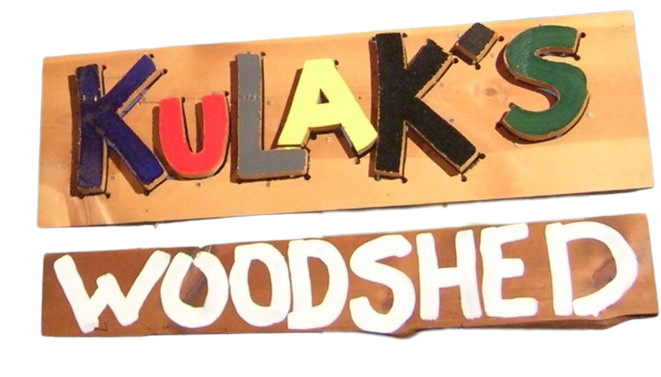
LA Weekly Best of LA 2004
“Best Acoustic Music Hideaway” by Joy Nicholson
Paul Kulak is unsuited for this century — maybe any century, but certainly this one. With his lumberjack’s physique and azure eyes, it’s easy to imagine him as a former All American javelin thrower. Harder to imagine are the five years and many thousand dollars he’s spent in his mission to provide “great, free, live singer-songwriter music for all.” “It’s hard to believe the quality of the musicians that show up sometimes,” says Alex Del Zoppo of the band Sweetwater. Both the Woodshed’s regulars and first-timers agree there’s nothing else quite like it. “It’s almost a miracle when someone does something just for the love of it,” one newcomer says. “I’ll be back. I love this place.”
Kulak, who lives in a one-room apartment and “never has a nickel in the bank,” says, “I’m just not a commercial person. The Woodshed isn’t about money. I just want it to be a pure labor of love.” A common enough desire for a college student, but Kulak is no 18-year-old idealist; he’s 44 this year. His North Hollywood storefront has been described as both a club and a second living room for musicians and geniuses. In any case, it’s more Das Kapital than venture capital — L.A.’s most alternative place to chat, laugh, listen and generally “worship the song.”
On a typical Monday open-mike night, there are 40 or so fans milling around the “stage” — a green Oriental rug on the floor. A friendly fivesome reclines on a canopy bed in the corner; others settle into mismatched chairs, worn couches. The décor is visual jambalaya, every cranny crowded with bookshelves, fish tanks, stuffed animals, mirrors, framed poems, CDs, albums, stickers, even a pet bullfrog named Dufus.
On the higher-tech side are six video cameras ever scanning the room. Mounted on tripods, jib arms and an ingenious dolly system incorporating copper plumbing and an inverted skateboard, the cameras send out live Webcasts in the highest-quality audio and video found anywhere on the Internet. “The musicians might be playing some hole in the wall in North Hollywood,” Kulak says, in his trademark, laconic voice, “but they’re being watched in Iceland, in the Malay Archipelago, in Texarkana. We get e-mails from everywhere in the world.”
Understandably, remote viewers log in to check out the lineup, but being in the room, inches away from the performers, is best of all. The Woodshed’s casual ambiance is like a party, except no one is drunk and everyone is friendly. Women and shy people feel at ease when alone. Young and old amble in with dogs, books, guitars. There is no alcohol sold, and in fact, nothing sold — no cover charge, no valet parking, no wait staff, just an honor system for the tea and coffee offered in back.
Supported solely by donations, volunteers and Kulak’s job renting editing equipment, “This place is my soul turned inside out.” While describing his reverence for “woodshedding” — working on the craft of songwriting — Kulak smiles through a charming slight underbite. “I’ve always loved to hear good singer-songwriters,” he says, “but I felt unwelcome in other clubs and coffeehouses.”
Deciding regular music venues put too much emphasis on using performers as bait to attract an audience and make more money, Kulak opened the Woodshed in December 1999, so “great artists who should be famous but might not be” can play straight from the heart. Word of mouth quickly spread: The unusual venue became one of the most celebrated singer-songwriter hangouts in L.A. A former singer-songwriter himself, he has the greatest appreciation for struggling musicians and their often-unsung lives. He’s hopeful, yet philosophical, about whether the Woodshed can survive.
“It’s a struggle to keep going, sure. But then I watch the Woodshed video archives, and once again I’m reminded that this is just too special to let go of.”

